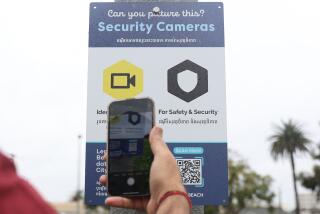Japanese Fear New ID System Is a Shoji Screen for Big Brother
- Share via
TOKYO — Akiko Tsuji, a 24-year-old businesswoman, hates having to renew her driver’s license, get a passport or register an address change. Simple procedures in Japan often involve visiting several offices, and it’s difficult to take time off from work, forcing her to go Saturday--with everyone else.
She’s exactly the type of computer-literate citizen the government wants to win over to its new citizens registry network. More than 90 procedures will be conducted with the click of a mouse, bureaucrats promise, as soon as everyone starts using an 11-digit identification number.
This sales job isn’t working very well on Tsuji, however.
“I’m really concerned about my privacy,” she said. “I believe there’s a chance the government could abuse my information, maybe sell it--who knows?”
Six days after the launch of the controversial system, the national response has been underwhelming. A major fear is that Big Brother may be lurking behind the shoji screen.
“The state will become a stalker,” social critic Makoto Sataka said.
On Monday, one citizens group is planning a rip-up-your-ID rally. That will follow anonymous threats sent to the ministry in charge of implementing the registry system and street protests. One of several letters on the issue sent to Prime Minister Junichiro Koizumi was accompanied by several shotgun shells and a curt, rudely worded message.
Some have even compared the initiative to another recent step the government took, giving Japan’s cattle population bar codes as a way to track “mad cow” disease. “10 digits for cows, 11 for people,” read one T-shirt distributed by citizen activist groups.
“Everyone is upset at being arbitrarily numbered by the government,” said Eiji Yoshimura, a member of the Consumers Union of Japan.
Also fanning fears are reports on the experience in South Korea, which computerized its 13-digit ID system in 1992.
Japanese have learned that South Koreans are asked to enter their numbers for access to pornographic Web sites. The numbers were also used to track down 13,000 South Korean drivers, Japan’s Asahi newspaper reported, when the state health insurer informed the police they’d been treated for mental illness. One taxi driver lost his license and his job; another driver, his wife.
The Japanese government, which is promoting the registry under its “e-government” initiative, counters that people have nothing to fear. Only a person’s name, address, birth date and sex will be listed, at least initially, while private data will be secure and computer systems made hacker-proof, it says.
Many Japanese are understandably skeptical. In 1999, information on 220,000 people in Kyoto prefecture was stolen by a part-time employee of a government subcontractor. In 2000, a Tokyo police sergeant was arrested for leaking criminal records to a credit research company.
And in May, the Defense Agency was found to be keeping blacklists on citizens who filed freedom of information requests, their legal right.
“A single system connecting tax, social security, pension and personal data sounds efficient and helpful, but there’s a huge potential for abuse,” said Hiroshi Yamada, the mayor of Tokyo’s Suginami ward, one of an estimated 100 local governments resisting the so-called Juki Net. “Pretty soon they might be tempted to start collecting information on which videos you’re renting or whether you’ve been reading Karl Marx.”
Critics also say the idea was imposed from above without much public debate or effort to answer people’s concerns.
Even at face value, they say, it’s unclear why the system is needed, particularly in light of projected start-up costs of $347 million on top of annual operating costs of $165 million.
The grass-roots resistance that’s sprung up from tiny hamlets to Yokohama, one of Japan’s largest municipalities, has sent jitters through a central government long used to having its edicts dutifully followed.
“It is illegal for a municipality to refuse to join the network,” Chief Cabinet Secretary Yasuo Fukuda told reporters.
The opposition has sent lawmakers scrambling to mollify critics, beef up penalties for bureaucrats leaking information and push for passage of a long-promised comprehensive privacy-protection law. Government officials who leak personal information now face up to two years in prison and an $8,700 fine.
But the passage of a privacy law is unlikely until at least next year. Furthermore, government officials are rarely sanctioned for sharing information with companies, and the fine could prove a relatively small deterrent as private firms salivate over this treasure trove of marketing data.
Hideaki Sakai, a 20-year-old college student, recently moved to Tokyo from the countryside. Within days of his arrival, he says, junk mail started arriving. Salesmen called him by name and even knew where he was from.
“It was a bit scary,” he said. “Personally, I’m very happy Suginami’s mayor opposed the system.”
In addition to sporadic protests, the system’s introduction Monday was also attended by computer glitches, including one particularly embarrassing case in which a local government sent supposedly confidential information to the wrong people.
Keiichi Niitsuma, 41, a self-employed Tokyo resident, said he supports the network.
“I think if there are enough penalties for leaking, it should be fine,” he said.
Most of the estimated 100 local governments dragging their heels, out of 3,241 nationwide, say they’ll comply when more secure privacy protection is enacted.
Activists say that even if the system goes fully into effect, as is likely, the issue has sparked awareness of individual rights in a country where citizens have rarely challenged governmental authority.
“Having 100 local governments speak out is great,” said Yoshiko Sakurai, a journalist and citizens’ activist. “When you consider their relationship and how the central government provides a lot of the local government’s budget, that takes quite a bit of courage.”
*
Takashi Yokota of The Times’ Tokyo Bureau contributed to this report.
More to Read
Sign up for Essential California
The most important California stories and recommendations in your inbox every morning.
You may occasionally receive promotional content from the Los Angeles Times.










